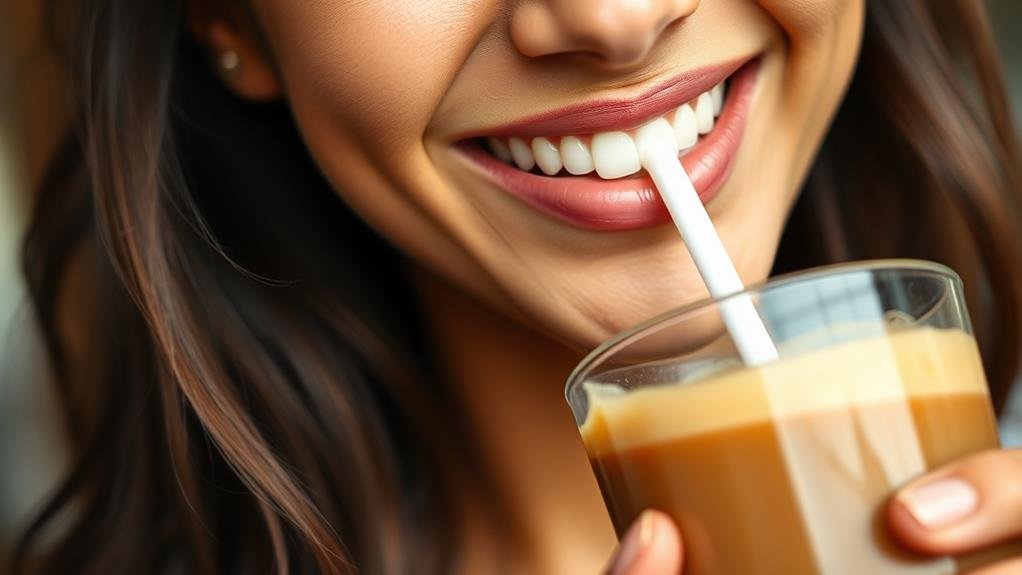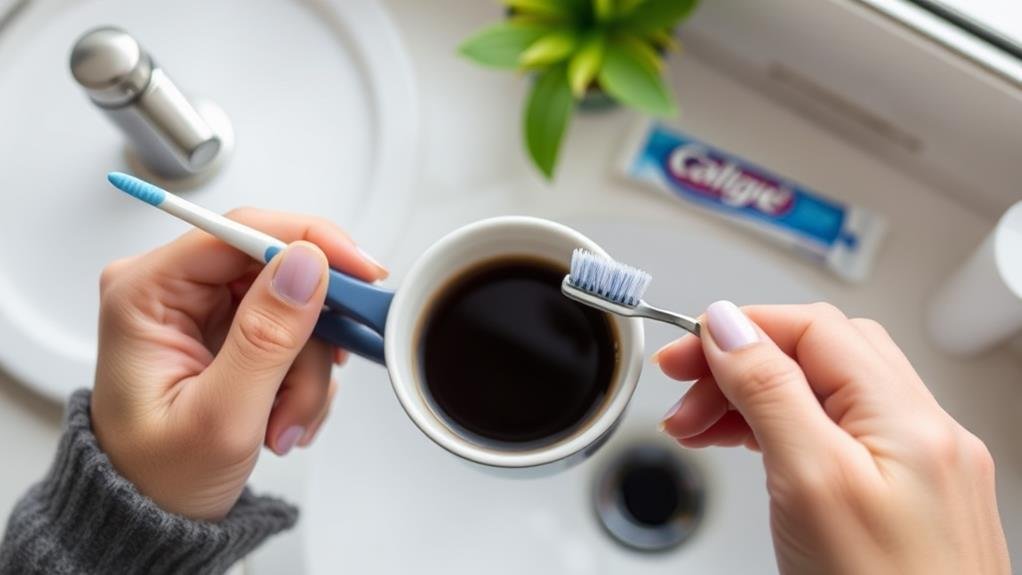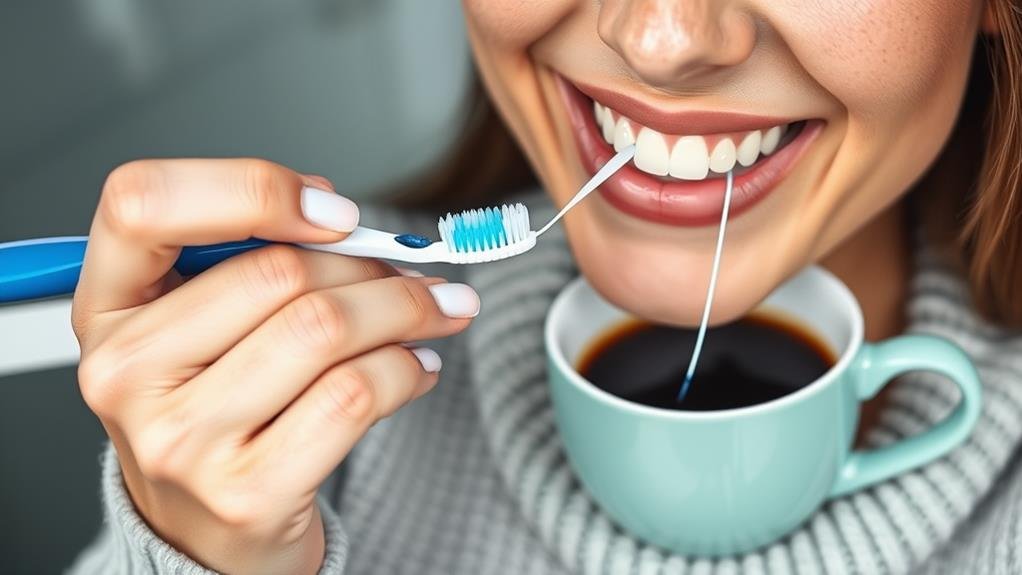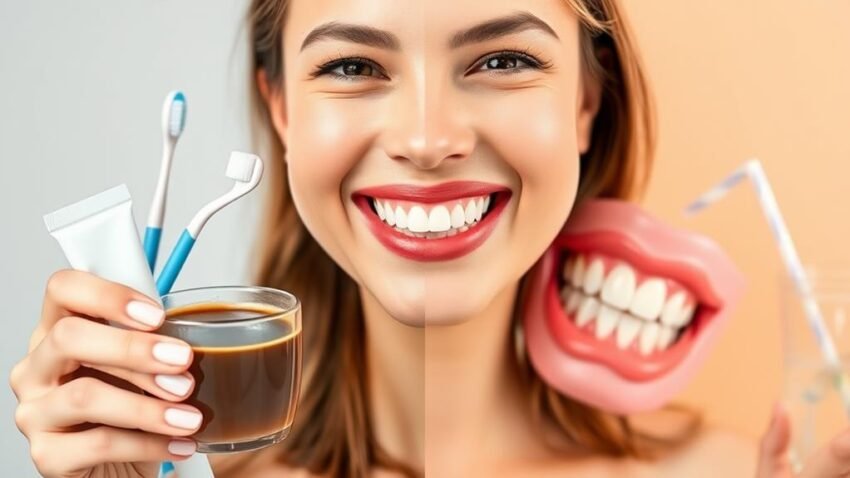As someone who loves coffee, I've often found myself worrying about the stains it leaves on my teeth. Over time, I've learned a few strategies that can help reduce these unsightly marks. For instance, limiting your coffee intake to just 1-2 cups a day can notably decrease exposure to staining tannins. But there's more to it than just cutting back; there are practical steps you can take to enjoy your coffee while keeping your teeth clean. If you're interested in maintaining that perfect smile, let's explore some effective ways to minimize coffee stains on your teeth.
Limit Coffee Intake

Limiting your daily coffee intake to 1-2 cups is a straightforward way to reduce the amount of staining tannins on your teeth. By reducing your coffee intake, you can notably lower the risk of developing stubborn stains on your enamel. Tannins in coffee are a primary cause of yellowing and discoloration over time, so limiting consumption can help prevent this issue. Additionally, embracing premium coffee beans with lower tannin content can contribute to a more sophisticated coffee experience while also being gentler on your teeth.
Lowering your coffee intake decreases the exposure of your teeth to these tannins, leading to less noticeable staining. This simple adjustment can alleviate the impact of coffee stains on your teeth. If you're accustomed to drinking multiple cups of coffee each day, cutting back will reduce the frequency and amount of tannins coming into contact with your teeth.
Eat Before Coffee
Eating before drinking coffee can greatly reduce the risk of teeth staining. By consuming food, you create a protective barrier on your teeth that helps minimize direct contact with tannins, which are compounds in coffee that cause discoloration. Having a meal prior to coffee also boosts saliva production when you chew on raw fruits and vegetables, which aids in neutralizing acid and preventing stains.
Food Barrier Creation
When you're about to indulge in a cup of coffee, consider starting with a snack or meal. This simple habit can create a protective barrier on your teeth, reducing the risk of staining. By eating food before drinking coffee, you create a food barrier that lessens the absorption of tannins and pigments onto your teeth, thereby diminishing staining.
Eating foods like fruits and vegetables stimulates saliva production, which aids in washing away coffee residue. This can help minimize the direct contact between coffee and your teeth, further decreasing the risk of stains. Additionally, chewing on raw fruits and veggies before coffee consumption helps neutralize acids that could otherwise impact your tooth enamel.
Creating this food barrier is a straightforward way to protect your teeth from coffee's staining effects. By making it a habit to eat something before drinking coffee, you're taking proactive steps to safeguard your oral health and maintain a stain-free smile. So next time you reach for that cup of coffee, remember to start with a small meal or snack to shield your teeth effectively.
Pre-Coffee Meal Importance
Before you grab that cup of coffee, consider the importance of having a meal or snack first. Eating before coffee consumption can notably reduce the risk of staining your teeth. When you eat a meal before drinking coffee, it creates a protective barrier on your teeth. This barrier decreases direct contact between the coffee and your tooth enamel, minimizing the potential for staining.
Having a pre-coffee meal also stimulates saliva production, which helps wash away coffee particles and reduce staining. Saliva acts as a natural cleanser that aids in removing harmful substances from your mouth. Additionally, the tannins in coffee are less likely to adhere to your tooth enamel when there is food present. This protective effect prevents the absorption of coffee stains into the porous enamel of your teeth.
Increase Fruit and Veggie Consumption

Boosting your intake of raw fruits and vegetables can be a powerful way to combat coffee stains on your teeth. These foods not only provide essential nutrients but also serve as natural teeth cleaners. Additionally, maintaining a balanced diet can complement your coffee habits and contribute to better oral health, including the use of grind size adjustments for your coffee preparation.
When you chew on raw fruits and vegetables, you boost saliva production, which helps naturally cleanse and protect your teeth from coffee stains. Here are some key benefits:
- Natural Teeth Cleaners: Fruits and veggies with natural fibers act as abrasives, breaking down bacteria and residue that can lead to staining.
- Reduce Staining Effects: Raw fruits like apples, carrots, and celery can help remove surface stains and promote saliva production, reducing the effects of coffee on teeth.
- Antioxidant Benefits: Consuming fruits and vegetables rich in antioxidants can help combat the oxidative stress caused by coffee consumption, potentially reducing teeth staining.
- Colorful Options: Incorporating a variety of colorful fruits and vegetables in your diet provides essential nutrients for overall oral health.
Add Milk to Coffee
If you're looking for a straightforward way to reduce coffee stains on your teeth, adding milk to your coffee can be a game-changer. The key lies in the interaction between milk and the tannins in coffee, which are responsible for the discoloration. When you add milk, the casein protein it contains binds to these tannins, preventing them from adhering to your teeth and causing stains.
Whole milk is particularly effective at this due to its higher content of casein protein compared to non-dairy alternatives. This protein forms a protective barrier on your teeth, reducing the adhesion of coffee stains. As an added benefit, mixing milk with coffee also enhances the texture of your beverage, making it creamier and more enjoyable.
Opting for milk in your coffee is a simple yet effective way to minimize the impact of coffee on teeth discoloration. By incorporating milk into your daily coffee routine, you can enjoy your favorite drink while also protecting your teeth from unwanted stains. This small adjustment can make a significant difference in maintaining the health and appearance of your teeth over time.
Use a Straw for Coffee

When you're sipping on your favorite coffee, using a straw can greatly reduce the risk of stains on your teeth. This simple trick is particularly effective for iced or cold brew drinks, where the liquid has more time to interact with your enamel.
Here are some key points to bear in mind:
- Minimize direct contact: Drinking coffee through a straw minimizes direct interaction between the coffee and your teeth, reducing the risk of stains.
- Prevent prolonged exposure: Straws help prevent coffee from coming into extended contact with enamel, decreasing the likelihood of discoloration.
- Limit tannin exposure: Straws create a barrier between coffee and teeth, limiting the exposure to tannins that cause stains.
- Maintain a brighter smile: Opting for a straw when enjoying coffee can be a simple yet effective way to maintain a brighter smile.
Using a straw for coffee consumption is straightforward and beneficial. By creating this barrier between the coffee and your teeth, you reduce the chance of coffee stains. This method is especially useful for iced coffee, where the risk of discoloration is higher due to longer contact times. Incorporating this habit into your daily routine can help in reducing stains and maintaining healthier-looking teeth.
Drink Coffee in One Sitting
Drinking coffee in one sitting is a simple yet effective way to minimize staining time and reduce tannin buildup on your teeth. By consuming your coffee quickly, you limit the exposure of tannins to your tooth enamel, which in turn decreases the risk of stains. This approach helps prevent prolonged contact between tannins and your teeth, making it easier to maintain a whiter, healthier smile.
Minimize Staining Time
To lessen the staining effects of coffee on your teeth, try consuming it all at once. This approach can greatly reduce the exposure time of tannins to your enamel, which is essential for preventing stains.
When you sip coffee throughout the day, you prolong the contact between tannins and your enamel, increasing the risk of stains. Here are some key points to keep in mind:
- Decrease Staining Time: Drinking coffee in one go decreases the exposure time of tannins to your teeth.
- Reduce Tannin Buildup: Consuming coffee quickly lessens the time tannins have to adhere to your enamel.
- Avoid Stains: Limiting coffee consumption to one sitting helps avoid tannin buildup and discoloration.
- Whiter Smile: Opting for one uninterrupted coffee session can help maintain a whiter smile by minimizing tannin exposure.
Reduce Tannin Buildup
By consuming your coffee in one sitting, you're not only minimizing the staining time but also directly reducing tannin buildup on your teeth. This approach is important because tannins are the main culprits behind coffee stains. When you limit your coffee consumption to one sitting, you minimize the opportunities for tannins to stick to your enamel.
Avoid sipping coffee throughout the day, as this prolonged exposure allows tannins to adhere and accumulate on your teeth. Instead, drink your coffee quickly to prevent these compounds from lingering in your mouth. This method helps reduce tannin buildup significantly.
Additionally, drinking water after consuming coffee can be beneficial. Water helps wash away residual tannins, further reducing the staining effects. By incorporating these habits into your daily routine, you can effectively manage tannin buildup and keep your teeth looking cleaner and healthier.
Brush Teeth Immediately After Coffee

How often do you find yourself sipping a cup of coffee without thinking about the immediate impact it has on your teeth? Coffee can leave behind tannins and residues that lead to staining, but there's a simple way to prevent this: brushing your teeth right after coffee consumption.
Brushing teeth immediately after coffee is essential for several reasons:
- Removes tannins and residues: This helps prevent coffee stains from forming.
- Protects enamel: The acidity in coffee weakens enamel, making it more prone to staining.
- Strengthens with fluoride: Using a fluoride toothpaste can help fortify enamel and guard against staining.
- Prevents stubborn stains: Delaying brushing allows tannins to settle and adhere to enamel, making stains more challenging to remove.
Using a soft-bristled toothbrush gently but effectively removes coffee particles and prevents discoloration. By incorporating this habit into your daily routine, you can notably reduce the risk of coffee stains on your teeth. Remember, prompt action is crucial to maintaining a healthier, whiter smile. So next time you finish your cup of coffee, grab your toothbrush and give your teeth the care they need.
Use an Electric Toothbrush
Using an electric toothbrush can greatly improve your daily brushing routine and effectively remove coffee stains from your teeth. The oscillating or rotating bristle movements of electric toothbrushes are more efficient at dislodging stains and plaque compared to manual toothbrushes. Additionally, many electric toothbrushes come with built-in timers that help guarantee you brush for the full recommended two minutes, making them a valuable tool in maintaining oral health and reducing coffee stains.
Effective Stain Removal
When it comes to reducing coffee stains on your teeth, an electric toothbrush can be a game-changer. Here's why:
An electric toothbrush offers several advantages over a manual one when it comes to stain removal. Here are some key benefits:
- More Plaque Removal: Electric toothbrushes can remove 21% more plaque than manual toothbrushes.
- High Brush Strokes Per Minute: They offer up to 30,000 brush strokes per minute, which is notably more than what you can achieve with a manual toothbrush.
- Effective Stain Breaking: The oscillating motion of an electric toothbrush helps break down coffee stains more efficiently.
- Whitening Modes: Some electric toothbrushes come with whitening modes designed to combat tough coffee stains.
Using an electric toothbrush for at least two minutes twice a day can notably reduce coffee stains on your teeth. The high speed and oscillating motion work together to break down and remove coffee residues efficiently. Additionally, the enhanced plaque removal helps keep your teeth cleaner overall, making it easier to maintain a stain-free smile. By incorporating an electric toothbrush into your daily oral care routine, you'll be better equipped to remove coffee stains and keep your teeth looking their best.
Daily Brushing Routine
To maintain a coffee stain-free smile, incorporating an electric toothbrush into your daily brushing routine is vital. Electric toothbrushes are more effective than manual ones, removing 21% more plaque and preventing coffee stains. Using an electric toothbrush with a built-in timer assures you brush for the full recommended 2 minutes, which is essential for effectively removing stains.
The oscillating or rotating bristles of these toothbrushes can reach areas that are hard to clean with a manual brush, reducing the chances of coffee stains accumulating. Additionally, electric toothbrushes help prevent enamel erosion caused by coffee acidity, maintaining the whiteness of your teeth.
As a coffee drinker, regular brushing and flossing are necessary to prevent staining. An electric toothbrush enhances this process, making it easier to maintain good oral hygiene. While using whitening toothpaste can also help, it's the consistent use of an electric toothbrush that prevents new stains from forming. Combining this with regular visits to your dentist will keep your teeth healthily white and stain-free. By integrating an electric toothbrush into your daily routine, you're taking a proactive step towards maintaining a coffee stain-free smile.
Regular Brushing and Flossing

Brushing your teeth at least twice a day is essential for eliminating coffee stains and preventing plaque buildup. This habit helps in maintaining oral health and keeping your teeth clean. Regular brushing and flossing are vital components of a healthy oral hygiene routine.
When it comes to reducing coffee stains, here are some key points to remember:
- Brushing: Use a whitening toothpaste containing baking soda or hydrogen peroxide to help combat surface stains caused by coffee.
- Flossing: Perform this daily to clean between teeth and remove hidden food particles that can contribute to staining.
- Prevention: Regular brushing and flossing can help prevent the formation of new coffee stains on teeth.
- Professional Care: Don't forget about professional dental cleanings every six months; they are essential for removing stubborn coffee stains and maintaining overall oral health.
Professional Whitening Treatments
If you're seeking a more assertive approach to eliminating coffee stains, professional whitening treatments at the dentist's clinic can be highly effective. These treatments are designed to address deep coffee stains that regular brushing and flossing may not be able to eliminate. The process involves applying a bleaching gel directly to your teeth, which is then activated with a light. This method is considered safe and effective for removing persistent stains.
Professional teeth whitening is particularly advantageous because it offers immediate results. Unlike home kits that may take weeks or months to show noticeable differences, professional treatments provide a significant improvement right after the procedure. However, the cost can vary depending on the severity of the stains. Despite this variability, many find the investment worthwhile due to the dramatic change it can make in their smile.
When considering professional cleaning and teeth whitening, it's important to remember that it's done under the supervision of a dental professional. This guarantees that the treatment is tailored to your specific needs and that any potential risks are minimized. Overall, professional whitening treatments at the dentist's clinic are a dependable option for those seeking to rid their teeth of unsightly coffee stains.
Conclusion
By following these simple tips, you can greatly reduce coffee stains on your teeth. Limiting your coffee intake to just 1-2 cups a day is a great start. Adding milk, eating before you drink, and brushing right after can make a huge difference. It's not rocket science, but it's like building a fortress against stains Regular brushing and flossing are essential, while professional whitening treatments can be the final touch to keep your smile shining bright.

